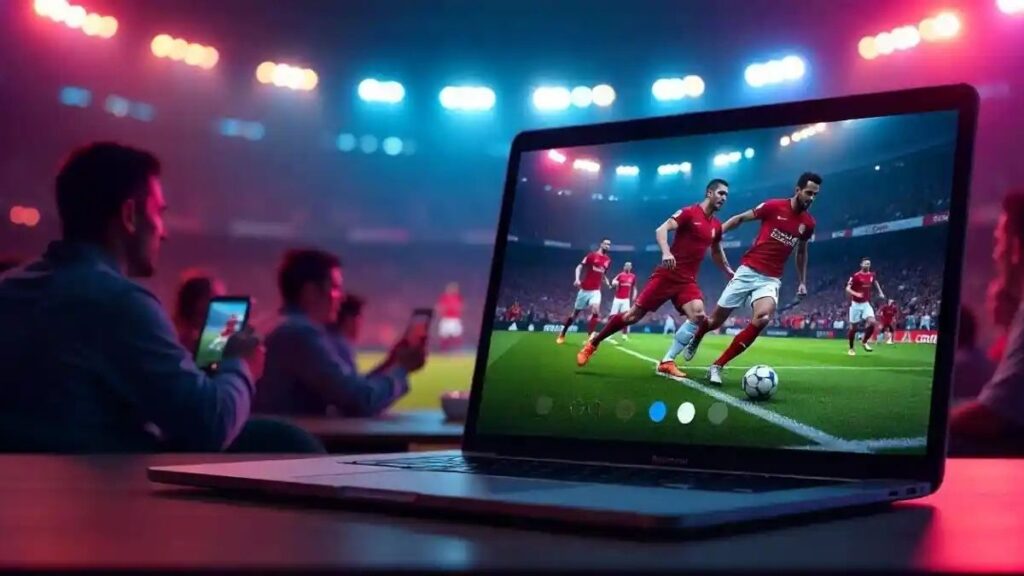In a world where official streaming platforms are multiplying like pop-up ads, VIPLeague has become the internet’s wildcard MVP. For the average fan with a shaky budget and a sharp browser, it’s a secret weapon. For networks, advertisers, and regulatory bodies? A persistent digital ghost. Equal parts rebellious and resourceful, VIPLeague sits at the fascinating intersection of sport, piracy, and digital democratization.
But what exactly is VIPLeague? Why does it continue to thrive despite countless shutdown attempts, domain hops, and lawsuits? And perhaps most compellingly — what does its existence say about the modern sports experience?
Let’s stream into the chaos.
What Is VIPLeague?
At its core, VIPLeague is a free sports streaming platform that aggregates links to live sporting events. It doesn’t host the content directly; rather, it acts as a highly organized portal redirecting users to third-party streams — a clever maneuver in the high-stakes game of internet legality.
The interface is straightforward and functional. No glitz, no glam — just rows of sports icons: football, boxing, motorsports, MMA, tennis, even darts. Click one, and you’re presented with a series of links, each leading to an external stream. These are often low-latency, free, and — more often than not — dubiously legal.
Whether you’re after Premier League clashes, UFC title bouts, or the odd rugby test match, VIPLeague seems to have it, like a black market Netflix for adrenaline junkies.
The Rise of the Rogue Streamer
So how did VIPLeague become a household name (albeit in whispered tones) among sports fans?
The timeline is murky, as is often the case with sites that live in the grey zone. VIPLeague has been around for over a decade, but its real rise began in the mid-2010s — around the time sports broadcasting began transitioning to premium digital platforms.
Think about it. A sports fan today needs multiple subscriptions: ESPN+, DAZN, Peacock, Paramount+, and others — just to keep up. Each comes with regional blackouts, delayed streams, and frustrating paywalls.
Enter VIPLeague: one site, one portal, all sports — and free. It was only a matter of time before frustrated fans latched on. In many ways, VIPLeague didn’t create demand; it filled a vacuum left by a fragmented streaming ecosystem.
The UX of Illicit Streaming
You’d think a shadowy site like VIPLeague would feel dodgy. In truth, it’s surprisingly clean and intuitive. No aggressive pop-ups or malware minefields (unless you click the wrong mirror). It wears the mask of legitimacy with confidence.
The site also updates quickly — a must for sports streaming. Kickoff at 7:00 PM? Links are often up by 6:30. Stream quality varies, but many are 720p or better. Some even offer multiple audio tracks, including local commentary. For a free service, the experience can rival — or surpass — that of legal alternatives in certain regions.
Yet, navigating VIPLeague isn’t always seamless. Mirror links go down mid-match. Streams freeze. Pop-ups still exist (though more tolerable with ad blockers). It’s a bit like watching a game on a smuggled TV set in a dive bar — gritty, unpredictable, yet oddly thrilling.
Who Uses VIPLeague?
Demographics are hard to pin down, but common threads emerge.
-
Budget-conscious fans: College students, lower-income households, or just those unwilling to fork over $20+ a month for each league.
-
Expats: People living abroad who can’t access their home country’s sports coverage due to geo-restrictions or blackout rules.
-
Digital natives: A younger generation that expects on-demand everything — and views “piracy” less as a crime, more as a convenience.
A quick scroll through Reddit’s sports streaming forums confirms it: VIPLeague has fans in every corner of the globe. From Argentine fútbol obsessives to North American NFL junkies, the site is often the first — and only — resort.
The Legal Minefield
Let’s get real: VIPLeague is not legal. It skirts copyright law by not hosting content, but that’s a technicality, not a get-out-of-jail-free card. Anti-piracy organizations and media conglomerates like the Premier League, MLB, and UFC have waged war on VIPLeague and similar sites for years.
This has led to a whack-a-mole existence. VIPLeague frequently changes domains — from vipleague.lc to vipleague.bz to vipleague.st — staying one step ahead of takedowns. Sometimes it goes dark for weeks, only to re-emerge under a slightly tweaked URL.
Authorities have gone as far as raiding operators’ homes and pressing criminal charges. In 2020, the UK’s Premier League even obtained a landmark court order to block illegal streaming sites en masse through internet service providers.
Still, VIPLeague endures. Why? Because it’s not a single site — it’s a blueprint. Clones and mirrors can be spun up within hours. The tech is decentralized, the audience loyal, and the content demand insatiable.
Is It Ethical?
Now, here’s where things get murky.
There’s no denying that VIPLeague deprives networks and rights holders of revenue. That impacts broadcasters, yes — but also teams, athletes, and production crews. It chips away at the business model that keeps sports running.
But critics of this view argue that many VIPLeague users wouldn’t have paid anyway. For them, the site doesn’t replace revenue — it taps an otherwise unreachable market. It’s a classic Robin Hood dynamic: steal from the rich (networks), stream to the poor (fans).
There’s also a growing argument that VIPLeague is symptomatic, not villainous. It’s the market’s way of protesting bloated subscription models, geo-blocks, and the weaponization of sports content. Much like Napster in the music world, it highlights a flawed system — and forces evolution.
The Technological Arms Race
VIPLeague operates in a cat-and-mouse war with authorities, and the battlefield is technical.
On one side:
-
Anti-piracy bots scour the web for stream links, issuing takedown notices en masse.
-
Internet service providers (ISPs) throttle or block domains.
-
Cloudflare and other services are pressured to drop support for illicit sites.
On the other:
-
VIPLeague developers rotate domains, deploy mirror sites, and use obfuscation techniques.
-
Users share tips via forums, Discord servers, and Telegram groups to access new working links.
-
Browser plugins and VPNs provide anonymity, access, and security.
This arms race has birthed a culture of stealth. VIPLeague users learn to install ad blockers, clear cookies, spoof locations, and navigate around cyber pitfalls like seasoned hackers. It’s more than fandom — it’s digital guerilla warfare.
Alternatives to VIPLeague
If the legal gray zone makes you uneasy, you’re not without options. Plenty of legitimate streaming platforms offer excellent sports coverage — albeit at a price:
-
ESPN+: Great for UFC, boxing, NCAA sports, and MLS.
-
DAZN: Boxing, MMA, and global sports.
-
Peacock: Premier League and select international events.
-
Paramount+: Champions League and more.
-
FuboTV, Sling TV, YouTube TV: Cord-cutting bundles for multiple sports channels.
But again, cost adds up fast. Subscribing to all platforms to access every major league might run you well over $100 a month — and that’s without considering cable or regional restrictions.
That’s the value prop VIPLeague banks on: All sports, one site, zero dollars. For better or worse, it’s the deal fans keep accepting.
The Future of VIPLeague — and Sports Streaming
Here’s the twist: VIPLeague may not need to survive forever to have a lasting impact. Like LimeWire, Pirate Bay, or Soap2Day, it’s already shaped behavior. Viewers expect access. They expect affordability. They expect flexibility.
Some leagues are catching on. The NFL, for instance, is experimenting with global streaming via NFL+. UFC leans into ESPN+. European leagues are negotiating for more open digital access. The writing is on the wall.
Still, VIPLeague’s model won’t vanish overnight. As long as paywalls remain high and legal streams remain geographically locked, fans will find workarounds. Whether it’s VIPLeague or the next evolution, the hunger for open access won’t be silenced by takedown notices.
Closing Thoughts: What VIPLeague Really Represents
To dismiss VIPLeague as a pirate site is to miss the deeper point.
It is a mirror — reflecting both the passion of sports fans and the dysfunction of modern sports media. It’s the rebel child of an era where corporations hoard access and fans fight for scraps. It’s disruptive, defiant, and, yes, illegal — but also a conversation starter.
If VIPLeague teaches us anything, it’s that access matters. Fans don’t want free — they want fair. Until that balance is struck, the VIPLeagues of the world will continue to dominate the underground, pixel by pixel, stream by stream.






